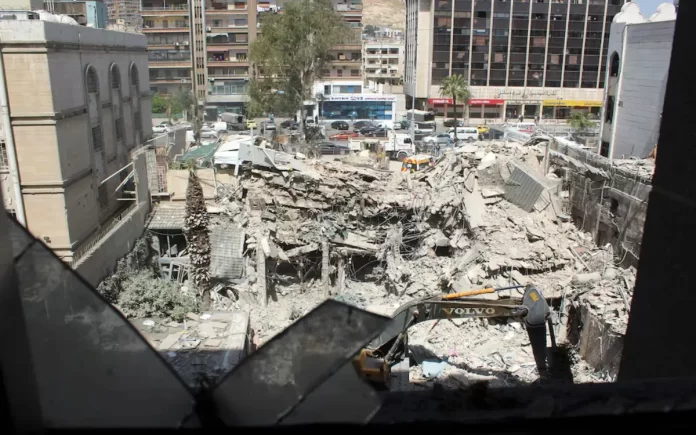Washington: Iran finds itself at a crossroads in the aftermath of an Israeli attack on its embassy in Syria. The strike, which resulted in the deaths of two Iranian generals and five military advisers in Damascus, has left Tehran grappling with how to retaliate without igniting a broader conflict, a scenario that Middle East analysts believe Iran seeks to avoid.
Iran’s Supreme Leader Ayatollah Ali Khamenei has vowed to seek revenge for the attack. However, Tehran’s response must tread carefully to prevent a full-blown confrontation. The options available to Iran are multifaceted: it could mobilize its proxies against U.S. forces, directly target Israel, or escalate its nuclear program, a move long opposed by the United States and its allies.
U.S. officials, speaking anonymously, are closely monitoring the situation for any signs of retaliation from Iran-backed groups against American troops stationed in Iraq and Syria. Previous Iranian attacks on U.S. forces halted in February after Washington responded with airstrikes following the killing of three American soldiers in Jordan.
Despite the absence of intelligence indicating immediate retaliation, the United States has issued a stern warning to Tehran against attacking its personnel. Deputy U.S. Ambassador to the U.N. Robert Wood emphasized that the U.S. military stands ready to defend itself and reiterated warnings to Iran and its proxies.
Also Read: North Korea Announces Successful Test of New Solid-Fuel Hypersonic Missile with Nuclear Capabilities
Iran faces a delicate balance: it seeks to respond decisively to deter future Israeli strikes while avoiding a full-scale war. One source, speaking anonymously, highlighted Iran’s challenge in crafting a response that demonstrates resolve without escalating tensions further. Failure to respond, the source suggested, could undermine Iran’s deterrent capabilities.
Potential retaliatory measures could include direct attacks on Israeli targets abroad, such as embassies or Jewish facilities. However, experts believe Iran may opt to target Israeli interests rather than confront U.S. forces directly. Elliott Abrams, a Middle East expert at the Council on Foreign Relations, posited that Iran aims to avoid a large-scale conflict with Israel, favoring alternative methods of response.
One such alternative could involve accelerating Iran’s nuclear program, which has seen increased activity since the U.S. withdrawal from the 2015 Iran nuclear deal. However, pursuing drastic measures such as enriching uranium to weapons-grade levels carries significant risks, including the possibility of Israeli or U.S. military intervention.
Despite speculation about potential responses, analysts do not anticipate a massive retaliation from Iran. Instead, Iran may seek to reassure its regional allies of its strength while avoiding actions that could escalate tensions further.
In navigating its response to the Israeli strike, Iran faces a complex set of considerations, weighing the desire for retaliation against the imperative to prevent a wider conflict in the region.



